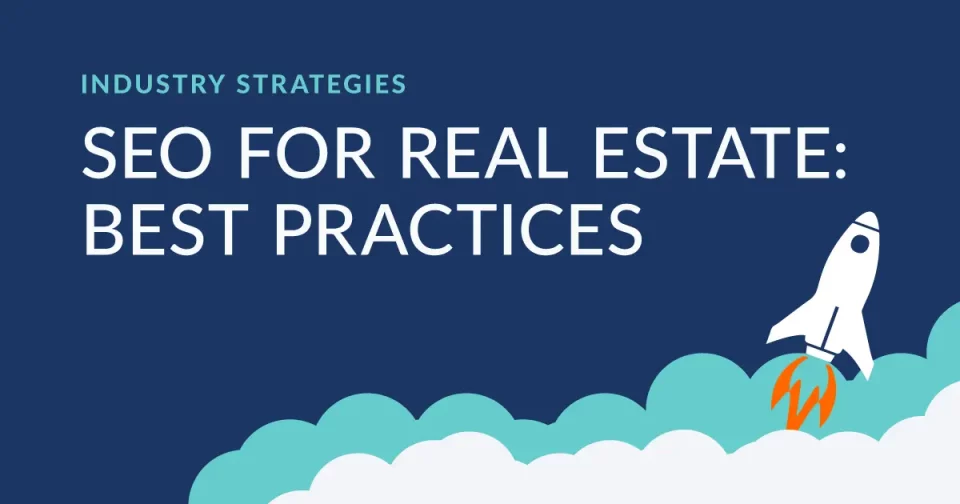
In an age where almost everything is just a click away, it’s crucial for real estate professionals to establish a strong online presence. The National Association of Realtors reported that 97% of buyers used the internet at least once during their search, and about half ended up buying a home they found online. Generationally speaking, another report found that 99% of home buyers between 23-56 use the internet to help them find a property.
Real estate agents who invest in SEO make 2-3x more sales every month than those who do not. And so, whether you are a real estate agent, broker, or property developer, SEO (Search Engine Optimization) is a powerful tool that elevate success in a highly competitive real estate market.
In this article, we will delve into the world of SEO for real estate, exploring why it’s indispensable for professionals in this industry.
Understanding SEO for Real Estate
Before we dive into the specifics, let’s briefly understand what SEO is. SEO is a set of strategies and techniques aimed at improving a website’s visibility on search engines like Google. The higher your website ranks in search results, the more likely it is to attract organic traffic from potential clients and investors.
Utilizing SEO in the real estate industry involves fine-tuning your website to grab search engines’ attention, resulting in a surge of web traffic and heightened visibility for your property listings. This strategic approach ensures you’re prominently placed before your ideal clientele.
When executed effectively, real estate SEO has the potential to drive up your website visitors, generate more leads, and boost conversions significantly. It’s a powerful tool for achieving your business goals.
Benefits of SEO for Real Estate Professionals
Increased Online Visibility
In the real estate, visibility is key. When potential clients search for properties or real estate services in your area, you want to see your website appear right at the top of the search results. That’s what Real Estate SEO can do for you. It works to ensure that you’re among the first options your prospective clients see.
Targeted Traffic
SEO not only brings more visitors to your website but also ensures that these visitors are genuinely interested in your services. It’s about quality over quantity. These are the individuals who are more likely to convert into clients. SEO’s ability to connect you with this highly targeted audience is invaluable. It’s like having a full crowd at your open house, filled with people genuinely interested in buying. That’s the power of SEO.
Enhanced Credibility
Trust is paramount in the real estate business, and SEO can help you build and maintain a stellar online reputation. Websites that rank well in search results are often perceived as more credible and trustworthy. When potential clients see your website at the top, it instills confidence in your services. It’s like being recommended by a trusted friend – people are more likely to choose you.
Local Dominance
Real estate is inherently local, and SEO can help you conquer your local market. With targeted local SEO strategies, you can ensure that you show up in local search results. When someone in your area searches for real estate services, your name should be right at the top of their list. It’s like becoming the go-to expert in your neighborhood, making you the first choice for anyone looking to buy or sell property locally.
Challenges in the Real Estate Industry
The real estate industry is notorious for its competitiveness, and online visibility is vital. However, it also poses unique challenges, such as localized searches and changing market dynamics.
The real estate customer journey tends to be more extended because of its intricacies. Typically, buyers kick off their search with a broad exploration before narrowing down to specific areas. To captivate the interest of these potential homeowners, real estate agents should consistently produce content through channels like social media and blogs. Yet, it’s equally essential to place emphasis on providing suburb insights, showcasing property images and listings, and presenting market reports as integral components of the real estate purchasing journey.
For real estate professionals, SEO is an ongoing endeavor. In a world where change is constant, the real estate sector stands out for its dynamic nature. This means that keywords and content need to be revised and updated often. Real estate agents must regularly assess both on-site and off-site SEO elements and make necessary adjustments to stay at the forefront of their industry.
In addition, SEO for real estate must consider that people searching for homes often look for specific information, such as:
- Housing costs
- Information on local school districts
- Travel duration to work
- Safety statistics
- Nearness to neighboring towns
- Availability of public transit
- Access to healthcare services
- Vibrant social and cultural scenes
- Employment opportunities
All that dictates a focus on local SEO. We review this below.
How SEO Addresses Real Estate Challenges?
The three pillars of on-page, off-page, and technical SEO are all critical to your digital marketing efforts. By fine-tuning your website and online business listings to match relevant keywords, you secure your spot in search results when local clients seek an agent.
However, remember that optimizing your website alone won’t suffice. Numerous ranking signals play a pivotal role in shaping your local real estate SEO strategy. These signals are the factors search engines evaluate when deciding where to position your website in search results, such as:
Local SEO Strategies
The three pillars of on-page, off-page, and technical SEO are all critical to your digital marketing efforts. By fine-tuning your website and online listings to match relevant keywords, you secure your spot in search results when local clients seek an agent.
Numerous ranking signals play a pivotal role in shaping your local SEO for real estate strategy. These signals are the factors search engines evaluate when deciding where to position your website in search results, such as:
- Backlinks
- Online reviews
- Google Business Profile listing
- On-page signals such as domain authority and keywords
- Business listings and citations
- Social signals such as shares and likes
Keyword Research and Optimization
Every neighborhood, every property, and every client is unique, thus keyword research and optimization are your secret weapons. SEO for real estate helps you identify the exact words and phrases potential buyers or sellers are typing into search engines when they hunt for real estate services. Armed with this knowledge, you can craft your website content, property listings, and blog posts to align perfectly with these keywords, ensuring that you’re at the top of the search results. It’s like speaking the same language as your audience, making it easy for them to find you online.
SEO isn’t a one-time effort; it’s an ongoing process. The real estate landscape is constantly evolving, with property trends shifting, new neighborhoods emerging, and client preferences changing. With SEO, you have the flexibility to adapt and fine-tune your keyword strategy in real-time. Whether it’s optimizing for trending keywords or targeting specific local phrases, SEO for real estate empowers you to stay agile in an ever-changing market.
Content Creation and Optimization
High-quality, informative content not only attracts visitors but also keeps them engaged. SEO involves optimizing your website’s content to be valuable and relevant to your audience.
Whether it’s blog posts, property descriptions, or informative articles, creating engaging and informative content is key. Here’s where SEO steps in. It guides you to understand the burning questions and concerns of your target audience. Through keyword research, you uncover the topics they’re searching for, enabling you to craft content that directly addresses their needs. By optimizing your real estate content with these relevant keywords, you ensure that it reaches the right eyes at the right time. It’s like offering a solution to a problem your clients didn’t even know they had, while at the same time positioning you as a valuable resource.
SEO isn’t just about generating content; it’s about optimizing it for maximum impact. SEO encourages you to structure your content for readability, incorporating headers, bullet points, and other formatting techniques that make it easier for your audience to absorb information. It also nudges you towards using high-quality images, videos, and interactive elements to keep your readers engaged. So, not only are you providing valuable insights, but you’re also delivering them in a way that keeps your audience captivated. In the online world where attention spans are precious, SEO ensures your message shines brightly and keeps your clients coming back for more.

Talk Strategy with a Fractional CMO
SEO. More SEO traffic with higher conversion rates.
Paid Media. Paid strategies with clear ROI.
Content. Epic content that attracts and gets shared.
SEO for Real Estate Best Practices
- Mobile-friendliness. A staggering 72% of buyers use mobile devices or tablets during their property searches. Thus, it’s imperative that your website is easily accessible and navigable on smaller screens.
- Keyword-rich titles and descriptions. Homebuyers frequently rely on search terms like ‘homes for sale in [city]’ or ‘[city] real estate listings.’ Incorporate these keywords into your website content to enhance your visibility in search results.
- High-quality images. Potential buyers crave well-lit, clear property photos before scheduling viewings. Don’t forget to add alt text for SEO and accessibility, including keywords, concise descriptions, and contextual information.
- Localize content. Infuse local keywords throughout your website to make it more discoverable for potential buyers searching within your area.
- Location, location. Incorporate your location into web page titles and tags. This signals to search engines your geographical relevance, increasing the likelihood of your website being displayed to those seeking properties in your region.
- Request client reviews. If you’ve provided exceptional service, don’t hesitate to ask satisfied clients for testimonials. A polite request for a review via email after a successful transaction can work wonders.
- Embrace social media platforms. Utilize social media as a powerful tool to showcase images, share testimonials, and highlight success stories. Facebook, LinkedIn, and Instagram are favored platforms among real estate agents. Facebook, in particular, is a treasure trove of business features, while LinkedIn facilitates networking within the industry, and Instagram’s visual appeal resonates with home enthusiasts.
- Go virtual. Enhance your SEO for real estate and engage potential clients by offering virtual property tours, allowing them to explore every aspect of a property in detail. This not only enriches the user experience but also drives increased web traffic.
SEO for Real Estate Trends
SEO for real estate is constantly evolving, and staying ahead of the curve is the key to online success. Let’s explore some of the current trends that are reshaping the way real estate professionals optimize their online presence.
Voice search optimization is becoming an increasingly important factor. With the rise of smart home devices and virtual assistants like Alexa and Siri, more and more homebuyers are using voice commands to search for properties. To harness this trend, real estate agents are optimizing their content with conversational, long-tail keywords that align with how people naturally speak. This ensures their websites are voice-search-friendly, enhancing their chances of being featured in voice search results.
Video marketing is another trend that’s taking the real estate industry by storm. With the immense popularity of platforms like YouTube and TikTok, real estate agents are creating engaging property videos and virtual tours to showcase homes. Videos not only provide a more immersive experience for potential buyers but also contribute to longer on-site engagement, a metric that search engines like Google value highly. By incorporating video content into their SEO strategies, agents are enhancing their website’s appeal and ranking potential.
Additionally, mobile-first indexing, high quality content, user experience schema markup, local SEO and SEO analytics remain important components in any successful campaign. Embracing these trends is no longer an option; it’s a necessity for those who aspire to excel in the competitive world of real estate.
DIY vs. Hiring SEO Professionals
When it comes to optimizing your real estate website for search engines, the question often arises: DIY or hire SEO professionals? While the idea of tackling SEO on your own may seem tempting, the intricacies of the real estate market and the evolving nature of search engine algorithms make it a daunting task. Here’s why opting for a professional SEO agency is the smart choice.
SEO professionals are well-versed in the ever-changing world of search engine optimization. They bring years of expertise and insights into the specific challenges of the real estate industry. They understand the nuances of local SEO, keyword strategies, and the competitive landscape like the back of their hand. By partnering with an agency, you tap into this wealth of knowledge, allowing you to leverage the most effective SEO strategies tailored to your unique needs.
Moreover, SEO agencies have access to cutting-edge tools and analytics that DIYers might not be familiar with. They can identify trends, track your website’s performance, and make data-driven decisions to continually optimize your online presence.
Whether it is to save time, tap into expertise or avoid salary commitments — or all of the above — contracting a SEO Management service ensures that your real estate business is poised for growth and visibility in an ever-competitive market.
SEO Tools for Real Estate Professionals
With SEO for real estate, a set of valuable tools can be your best companions on the digital journey. Consider employing tools like Moz Local, which provides in-depth keyword research, backlink analysis, and site auditing capabilities, all essential for optimizing your real estate website’s performance. SEMrush is another top-notch choice, offering comprehensive SEO analytics, competitive research, and valuable insights into your online competition. Additionally, Google Analytics and Google Search Console are must-haves for tracking website traffic, keyword performance, and user behavior, providing essential data to fine-tune your SEO strategy.
Measuring SEO Success
In pursuit of SEO for real estate success, it pays to keep a close eye on several crucial metrics to ensure you’re progressing online efforts. Here are five essential metrics to measure:
- Organic Website Traffic: The number of visitors who find your website through search engines is a fundamental metric. Increasing organic traffic means your SEO strategies are effectively drawing potential clients to your site. By regularly monitoring this metric, you can gauge the impact of your SEO efforts and identify trends over time.
- Keyword Rankings: Track the performance of the keywords you’re targeting. Are you climbing the search engine results pages (SERPs)? Are you ranking for the right keywords related to your real estate niche? Evaluating keyword rankings provides valuable insights into the relevance and effectiveness of your SEO strategy.
- Conversion Rate: Ultimately, SEO for real estate is not just about attracting visitors but converting them into clients. Measuring your website’s conversion rate tells you how many visitors take desired actions, such as filling out contact forms, signing up for newsletters, or scheduling property viewings. A high conversion rate signifies that your website is not only driving traffic but also engaging and persuading visitors effectively.
- Bounce Rate: A high bounce rate can be a red flag. It indicates that visitors are leaving your site quickly without exploring further. By monitoring this metric, you can identify potential issues with your website’s user experience or content quality and make the necessary improvements to keep visitors engaged.
- Local Search Performance: Given the localized nature of the real estate market, it’s crucial to track how well your website is performing in local search results. Metrics like local keyword rankings, Google My Business (GMB) listing visibility, and customer reviews and ratings can provide insights into your success in targeting clients within your service area.
By consistently monitoring these metrics, real estate professionals can fine-tune their SEO strategies, make data-driven decisions, and ensure their online presence remains competitive in the ever-evolving digital landscape.
Conclusion
SEO for real estate isn’t just a tool; it’s the key to unlocking untapped potential. As we conclude our exploration of why real estate professionals need SEO, remember this: SEO is your pathway to increased visibility, targeted traffic, and enhanced credibility. It’s the means to rise above the competition and become the go-to agent in your area. Embrace real estate SEO as an investment in your career, and watch your profile and business soar to new heights. Your growth starts here!







